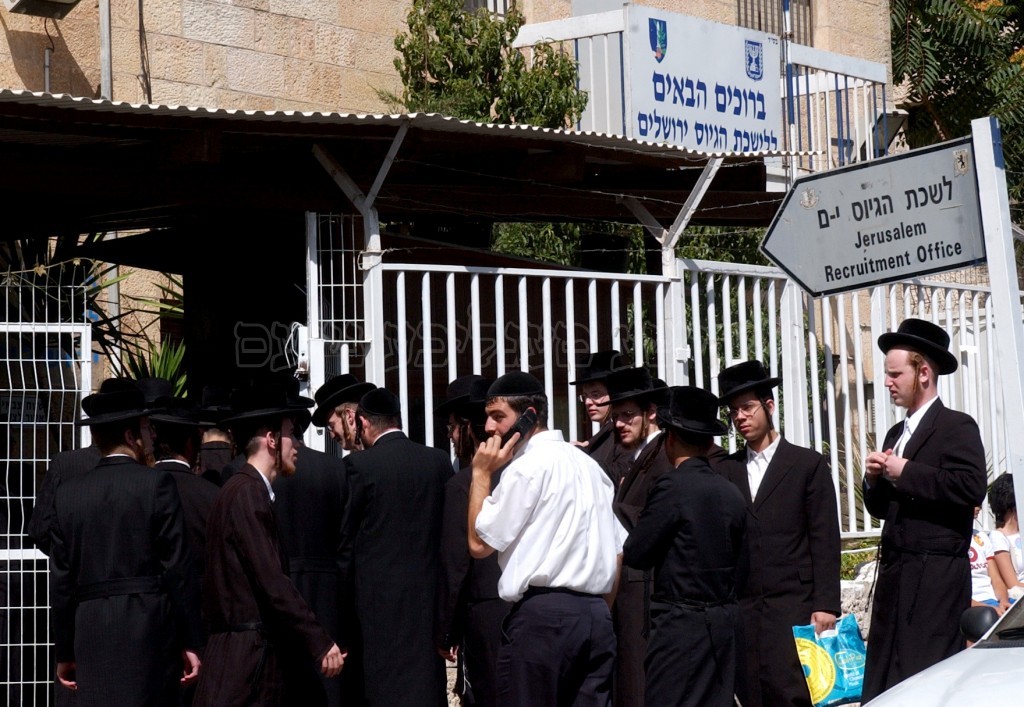Sir Isaac Newton and the New Haredim
In an op-ed originally published in Yedioth Ahronoth, Prof. Yedidia Stern shares thoughts on the connection between failure of the ultra-Orthodox "Tov" party in the local elections, the Haredi draft bill being debated by the Shaked Committee, and Newton's laws of motion.

What is the connection between the results of the recent municipal elections and the Haredi Draft bill being debated by the Knesset's Equal Sharing of the Burden Committee? And how are these two things related to the renowned physicist Sir Isaac Newton, father of the laws of classical mechanics?
Recent years have seen the development of the phenomenon of the "New Haredim." An integral part of Haredi society, modern ultra-Orthodox Jews are completely loyal to the values of the Haredi community and fully accept rabbinic authority. At the same time, however, they are willing to go beyond the walls of their self-imposed ghetto, to get an education and a profession, and to join Israeli society. This is a significant phenomenon, which has been growing rapidly in recent years. Currently, some 7,000 ultra-Orthodox students are enrolled in Israeli institutions of higher education, an increase of 250% in just five years. The combination of "ultra-Orthodox" and "college education" has become possible.
This phenomenon, however, is new and fragile and its future is not guaranteed. The conservative forces within the Haredi community are opposed to it, and are seeking ways to reinforce the "walls of holiness." The High Court of Justice gave them a boost when it struck down the Tal Law, the arrangement that had exempted Haredim from compulsory military service, which triggered renewed calls for separatism. What began as a supportive tailwind, however, has become a raging tornado, as the Knesset is currently debating a conscription law that might send thousands of ultra-Orthodox draft dodgers to jail. I have previously warned that "the Supreme Court decision may turn out to be a historic mistake: It may reverse the current trend of integration in Israeli society that has begun to emerge among the Haredi community and nip that change in the bud."See: In the Aftermath of the Tal Law on this site. Unfortunately, this warning is being fulfilled before our very eyes.
In response to the Peri Committee's threats of criminal sanctions against Haredi draft dogers, ultra-Orthodox extremists embarked on a successful campaign that dubbed Haredi soldiers "Hardakim" (an acronym for Haredim Kalei Daat that is similar to the Hebrew words for germs or insects), deeming them "weak minded" or "frivolous" Haredim. The geometric progression of growth in ultra-Orthodox conscription rates found in the last few years stopped, and there are even rumors—which the IDF denies—that Haredi conscription in the past year has declined. Moreover, if until recently ultra-Orthodox men reported to army recruitment centers following receipt of their first draft notice at age 17, hundreds of Haredim are now ignoring their notices—running the risk of arrest—as per the instructions of their rabbis. Similarly, in the realm of higher education, one of the largest ultra-Orthodox colleges has reported that for the first time in a decade, there has been a drop in demand for admission in the coming year.
The results of last week's municipal elections in Israel illustrate this downturn. Seven years ago, the "New Haredim" established a political movement called "Tov," which advocates Haredi integration in society and the workforce. In 2008, "Tov" was the surprise of the local elections, when its representative won places on the city councils of two ultra-Orthodox communities despite the efforts of Haredi rabbis and politicos to steamroll the "internal uprising." In the five years since then, the New Haredim gained support, leading to expectations that "Tov" would be very successful in the 2013 elections and that the tectonic changes sizzling beneath Haredi society would be firmly established in the political public sphere. But the party suffered a stinging defeat, failing dismally in all the locales where it ran. "Tov" was wiped out. Instead, in the mayoral race in Jerusalem, a significant share of ultra-Orthodox voters voted for an extremist rabbi who rejects all compromise and his representative is likely to serve as deputy mayor of the capital.
And here is where Isaac Newton comes into play. Newton's third law of motion stipulates that every action has an equal and opposite reaction; that is, any time one object exerts force on another, it will encounter a force of equal intensity in the opposite direction. Although Newton's laws of motion relate to physical objects, they can explain the relationship between the ultra-Orthodox and the State of Israel. When the Court, the media, and Israel's political parties attempt to overpower the Haredim by means of an overly aggressive move, it is to be expected that there will be an equally aggressive response in the form of steadfast refusal to cooperate. This is what we are beginning to see. As individuals, the new ultra-Orthodox want to get an education and to make a decent living, and tens of thousands of them wish to escape from the humiliating cycle of poverty. But when they perceive the environment as hostile and see the new government arrangements as an attack on their ultra-Orthodox identity, they immediately pull back, don conservative armor, and withdraw into their familiar ghetto.
The Knesset must wake up and reconsider its decision. It must not abandon the goal of equality in sharing the burden of military service, but it must find ways of achieving this goal that do not involve criminal sanctions. The damage caused by such sanctions far outweighs their benefit. It is vital to encourage the trends of change in Haredi society by economic mechanisms while protecting the human dignity of ultra-Orthodox Jews and their communities. One does not have to be Newton to understand this.
Yedidia Z. Stern is Vice President of Research of the Israel Democracy Institute and a Professor of Law at Bar-Ilan University.
This article was originally published in Hebrew in Yedioth Ahronoth on October 30, 2013.
